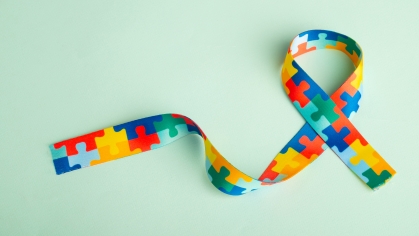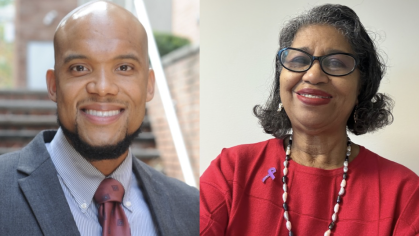E. Goldblatt Hyatt, DSW Program Director, Associate Professor of Professional Practice for Reproductive Justice and Associate Professor at Robert Wood Johnson Medical School, discusses Birth Trauma Awareness week, which takes place from July 16-22. Informed by their own personal experience, Dr. Goldblatt Hyatt explains the significance of recognizing Birth Trauma Awareness Week and offers ways to observe it.

Tell us a bit about your journey to social work.
From a very early age, I was aware of social justice issues, mainly through the work of my father, a Canadian labor lawyer who has always been at the forefront of civil rights work. Though I never planned on becoming a social worker, I was ultimately called to the field through an ongoing fascination with death and dying and how I could identify a vocation that helped me to find meaning while supporting others through that difficult process. This led me to getting a dual degree in social work and bioethics (MSW/MBE) and ultimately a doctorate in social work (DSW). My area of focus transitioned to reproductive justice after the loss of my first child, who was diagnosed with a rare and deadly fetal anomaly at 20 weeks gestation. We received compassionate abortion care, but I became aware that many individuals from across different intersections of life experiences do not have the same access or experiences that I was grateful to receive. I am now dedicated to teaching and practicing the tenets of reproductive justice across my clinical, teaching, and research roles.
Why is Birth Trauma Awareness Week significant to you?
The fact of the matter is that birthing situations, environments, and practices are not equivalent for all people. There is a history of reproductive policing and oppression in this country that dates back hundreds of years and is dictated by white supremacist forces. We know that for populations of color, immigrants, people living with disabilities, and queer people, access to safe and healthy birthing environments and interventions are less likely. Unfortunately, people from minoritized populations are less likely to have supportive perinatal care and are at higher risk of maternal morbidity and mortality. We saw this in the public eye when tennis star Serena Williams nearly died of a blood clot postpartum after her complaints were dismissed by her healthcare team or even more recently with the tragic death of Olympian Tori Bowie who died in childbirth. Birth trauma can take multiple forms, including forced or unwanted birthing interventions or procedures; not being believed when a birthing person is experiencing pain and discomfort; ignoring or dismissing a birthing person’s desires for how they would like to birth (for example, delayed cord clamping, skin-to-skin contact, etc.); removal of support people, and so much more. Calling awareness to these injustices is just the beginning for social workers to advocate for people who are at risk of or have experienced birth trauma.
How can the social work community recognize Birth Trauma Awareness Week?
Social workers truly need to engage in trauma-informed, supportive approaches with individuals who are more likely to experience birth trauma. They should also be aware that the definition of birth trauma, as a lived experience, is entirely dependent upon the individual who goes through it and therefore be open to supporting individuals across varied perspectives without judgment. Social workers should also not exist in a silo; our work should include collaboration with doulas, midwives, and other community and patient advocates and support systems to ensure that the voices of those most likely to experience birth trauma are valued, heard, and acknowledged.
What can the social work profession or social workers do to continue to support individuals beyond Birth Trauma Awareness Week?
Social workers need to get active and join reproductive justice organizations that advocate for supporting birthing and parenting people across intersectional life experiences. The Global Foundation for Girls (globalfundgirls.org) is a great nonprofit dedicated to birth justice awareness as well as other reproductive justice principles. They are committed to educating and empowering birthing people as well as creating better supports for birthing environments. Social workers should also familiarize themselves with the initiative out of First Lady of New Jersey Tammy Murphy’s office called Nurture NJ, which seeks to address major disparities in birthing outcomes across the citizens of New Jersey by eliminating racial inequities in health. According to the organization, “The disparities in maternal and infant outcomes are not the result of differences in genes or behaviors but are mostly explained by the differential historical, social, economic, and health environments experienced by Black and brown women. These economic and social differences matter for health; they are determinants of health, and as long as they exist, so will the disparities in maternal and infant health.” This is the perfect initiative for social workers to get behind. Their website is https://nurturenj.nj.gov/. Finally, social workers can check out THRIVE NJ, which advocates for sexual and reproductive health across New Jersey and centers the voices of the historically marginalized and underrepresented, at thrive-nj.com.
This story was created in partnership with Rutgers School of Social Work's Inclusion, Intersectionality, Diversity, Equity, and Advancement (IIDEA) Committee in support of our commitment to diversity, equity, and inclusion.



